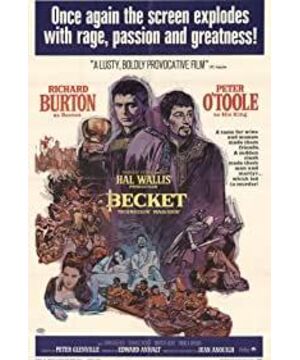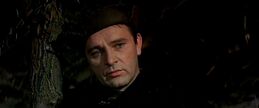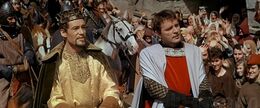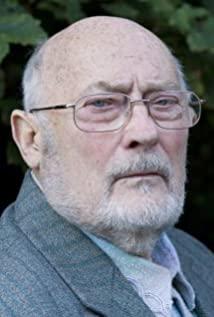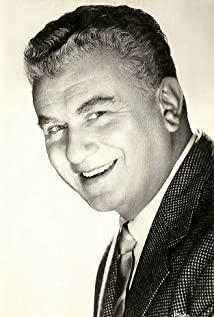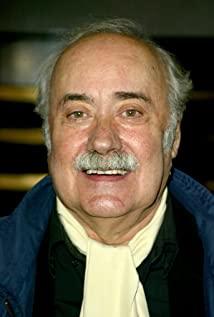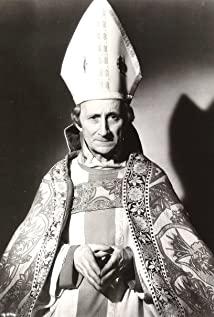Queen Eleanor: I gave you my youth, and I gave you your child.
Henry II: I don't like my children! As for your youth, this spent flower has been pressed between the pages of hymns since you were 12 years old, air-dried with no color and no fragrance, and it is not worth a tear to say goodbye to it. Your body is a barren desert, madam, and out of duty I have to venture alone. But you were never a wife to me, and Becket was my friend, full of life, generosity, and strength. Oh my Thomas!
Becket is my enemy. But in the human balance, traitor that he is and naked as his mother made him, he's worth 100 of you madam, with your crown and your jewels and your august uncle the emperor into the bargain. I'm forced to fight him now and crush him, but at least he gave me with open hands everything that is at all good in me, and you have never given me anything but your coping mediocrity and your everlasting obsession with your puny little person and what you thought was due to it! That's why I forbid you to smile while Becket is being destroyed!
I gave you my youth, I gave you your children.
I don't like my children! And as for your youth, that withered flower pressed between the pages of a hymn book since you were 12 years old with its watery blood and stale insipid scent, you can bid farewell to that without a tear. Your body was an empty desert, Madame, Which duty forced me to wander in alone. But you have never been a wife to me, and Becket was my friend, red blooded, generous and full of strength. Oh, my Thomas.
-- ------------------------------
This is a historical drama about King Henry II of the Norman royal family of England (Peter O'Toole) and the Saxon's personal nanny, oh no, it's the favorite Thomas Becket (Richard Burton), who had a close relationship and worked together to run the country. When the conflict between the church and the royal family was fierce, Henry II had a whim to nominate Becket to succeed him. The Archbishop of Canterbury thought that Becket's hard-hearted actions would help him keep the Church in the king's hands. Becket has always played political games around, and he had the confidence to coordinate the two sides. Unexpectedly, he had always been empty in his heart and had never been attached to anything. He quickly found the meaning of life in philanthropy, and was deeply inspired by his beliefs. A man whose heart is fighting for the glory of God, for this reason he has drawn a line from his old master. Because of love and hatred, Henry II tried his best to bring Becket to death, causing a tragedy for both sides...
The shooting techniques, acting methods, and the old-fashioned soundtrack of Gone with the Wind are all quite old-fashioned, with obvious traces of copying the stage play. The two protagonists face the camera from time to time and monologue everything in their hearts. Some of the subtleties of the movie. If Guangguang is at the level of the film, I don't think this can be regarded as the kind of film that can stand the test of the times.
But, so hot! Too warm! It's so hot that I can't help but think it's a circling romance film that was a specialty of the time when homosexuality was illegal!
It is recognized that this film basically has no historical credibility. First of all, Becket is not a Saxon in history... But as a fictional work, it is self-contained. The lines have almost no water, and they are all talking! Fortunately, I gave up MKV with subtitles such as VHS without subtitles, otherwise the enjoyment of watching the film will be reduced by four points. There are two themes of the film, one is the theocracy of monarchy, the line of political struggle in the material world is written too smoothly and directly. I think the director is more concerned with another theme, that is, the "big love" and "little love" in the spiritual world. "Great love" is the Christian faith. Becket ironically found a spiritual beacon through pure rights and interests, transcending worldly love and hate , reflecting that the spiritual path is that all roads lead to Rome and that there are few friends who travel alone. There are two contrasts: the young Saxon monk John never got rid of his narrow national hatred. On the other hand, Becket has always looked at the Norman royal family who had conquered England for more than a hundred years in a calm and expedient way. What he pursued was not a nation, but civilization; Although Henry II was so heartbroken in love (really, in the end, brother O'Toole pulled his chest and performed the scene of how Henry was so sad that his heart was broken with his acting skills that incorporated the essence of Jing Tao), but it was a kind of narrow-mindedness. , twisted, and possessive of love, and it is natural for each other to be miserable.
I just read Tolstoy's late short story "God and Man", about two revolutionaries who were arrested and imprisoned, one was sentenced to death but died calmly after understanding the gospel in prison, and the other struggled with self-discipline and wanted to be Nietzsche's superman and finally confronted reality. Suicide in despair is actually a missionary article, too red and fruitless to be convincing. Becket's film has a similar theme in the end, but fortunately it didn't turn into a promotional film. Because, as in many works of literature and art, the villain is more loved than the protagonist.
Thomas Becket turned from an enigmatic man with outstanding knowledge, deep shrewdness, roaming the court, advising the king quietly, and more nihilism, turning into a majestic saint with a single tendon, to be honest, it has become boring ( Although in Henry II's eyes Becket is a hundred times more interesting than anyone around him, whether he is an archbishop or not...). Crucially, he made the key transition in just ten minutes in two and a half hours. In this movie, where everything is said to be incomprehensible, only his transformation has not been explained. It can only be understood that he hit it off with the church life and discovered his hidden nature? ! No wonder Henry became a girl pulling daisy petals: love me, don't love, love me, so you never loved me? ! Believe it or not, there is really no reason to explain it. It can't be said that the transformed Becket is monochromatic, Burton, after all, has a pair of eyes burning with dark fire, and the scorching in his eyes never subsides throughout, thus partially saving the character. But compared with Henry II, I think Becket lacks the evolutionary level of the characters, although the introversion and exposure of the two people help to form the CP of the classic line.
And Henry II played by O'Toole, what a wonderful person! Although he has no blond hair and grows a beard, his beauty index has been slightly lowered, but the natural arrogance and the coquettishness and playfulness that he sacrificed his life to perform can only be described as breathtaking! The good thing is that this role does have progressive twists and turns. At first, I thought O'Toole was too overplayed and pretentious. This version of Henry II is completely an emotional animal, and his actions are influenced by huge ups and downs of impulsive emotions. After he ascended the throne for several years, he was always called "my prince" by Becket. According to His Majesty's logic, it seems that he only shares all his privacy and emotions with that one person without reservation, and the other party should return it with love and sincerity. But his rogue demeanor doesn't really show that he has anything to love from Becket.
But when the plot progressed to Becket trying to save an innocent village girl, the king took away his beloved lady in exchange for a joke, and the woman committed suicide. Here, the scum king showed his hierarchy for the first time. He trembled like a leaf and ran back to Becket's bedroom. The only thing is that I am afraid that I will leave a grudge with Becket because of this incident. While not hiding my vulnerability, I use the rank of monarch and minister to force the other party to comfort me, oh, the level is coming! Becket seemed helpless that he couldn't feel more heartbroken for the woman, and continued to play the role of the male nanny while suppressing a trace of impatience inspired by the king. He gave a monologue about what the honor he was looking for would be, and then... turned to the dark side. Hey, doesn't this paragraph imply something? There is only one bed! Soon the two went to fight in France, and they returned to the tacit understanding of the willful His Majesty's omnipotent butler. In the early morning, His Majesty the King's coquettish spirit conveyed "Thomas, you clearly love me, will you kill you if you say it?" "Information. His Majesty is mad at the other party for not saying "I love you" like he does...
Henry goes to a nervous breakdown after Becket turns to God's arms, and the drama becomes completely neurotic, my Interest suddenly increased. And how many innuendo lines did the screenwriter use to highlight the king's hopeless love that was so hot that his brain was burnt out. The root cause of their despair is probably not the emotion but the fact that Henry basically doesn't believe in God. In his eyes, God is his rival in love. Pulling God into the emotional whirlpool, the story is suddenly more advanced than Aunt Qiong Yao, and all the lines talking about emotions have double meanings. After His Majesty's love turned into unrequited love, it became more and more self-indulgent and self-pity, so morbid that it made people feel sorry for him, but why do I think he has become cute instead? Probably because, I thought he only knew empty talk, but he didn't expect that he actually practiced confession in his own way.
Becket was determined to stand on the side of the church and send a messenger to deliver a message to the king. On the other side, Henry II was still sitting by the window looking at the direction of Canterbury Cathedral while enduring the joint ridicule of his mother and wife, only the messenger came. , his first reaction was to care whether Becket was ill (yes, if he was, I wouldn't have thought that people would change his mind without saying hello in 10 minutes...) After listening to the general article, he immediately went alone in the rain After four hours of running to the church, "give me a reason!" (<- original words). When Becket gave back the token ring with a grief (<- that's how he divorced the king, hello, Gongjun!), Henry confessed as follows:
You give the lions of England back to me, like a little boy who dosen't want to play anymore. I would have gone to war with all England's might behind me or even against England's interest to defend you, Thomas. I would have given away my life, laughingly for you. Only I loved you and you didn't love me, that's the difference. Stay away! But thank you for this last gift as you desert me. Now I shall learn to be alone.
You returned the Three Lions Seal Ring to me like a tired boy. I would fight for you with all the strength of England, and even turn my back on England's interests and defend you, Thomas. For you, I can even give up my life with a smile. Just because I loved you and you never loved me, that's the difference. ……Do not touch me! But thank you for this last gift when you abandoned me. From now on, I will learn to be alone.
At this moment, I secretly laughed: Is it nice to say? I really didn't expect it to be done, in a distorted way: in order to stimulate Becket, he messed up the stability of the royal family or the relationship with the Holy See... Although it was a passive act of self-destruction and self-abandonment, he somehow overwhelmed the royal family's bargaining chip. Because, in this person's increasingly hopeless unrequited love and revenge, he finally progressed to the point where he felt that the only one in the whole world that I truly loved (<- I believe), and the only one who gave me love degree (<- where does this generalize...). In this film, the irony of his wife's wife is all roundabout, what lures you away from the obligation of husband and wife, what is unhealthy obsession that goes against nature, what I tolerate so many mistresses of you but I really can't stand this, wait, it's his turn The answer, it's all simply love, love, love!
But I think Henry's most lethal moment was when the two of them met on the beach and negotiated. Henry complained about being cold as before. Becket said I didn't teach you to fight fire with fire and take a cold shower every morning. Henry replied, I only wash when you are around me every day to urge me, and now I stink all over. That's it. O'Toole's expression, plus his blue eyes that were too beautiful, brought tears to my mother's eyes.
Finally, attach the concluding remarks that His Majesty made in front of the four lackeys (he really treated these mindless noble warriors as loyal dogs): A man who ate my bread. A man I raised from nothing. A man I loved. Yes, I loved him. I loved him, and I still do. Enough, oh God, enough! Stop. Stop! I can do nothing, I'm as useless as a woman. So long as he's alive, I tremble, I shake. I'm the king, and yet I shake.
…………It's so jingtao that I dare not write it in Chinese, so let's see. By the way, he was still looking at the void and called out in a blur: Thomas..!
A lot of people debate whether this is Platonic love, I think, there is no evidence that they are purely spiritual friendship, but there is no lack of hints of rolling sheets. So I understand that the Lionheart King and the French King Philip II in "Winter Lion" are called "the upper beam is not straight and the lower beam is crooked"...
View more about Becket reviews


